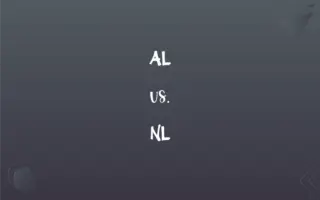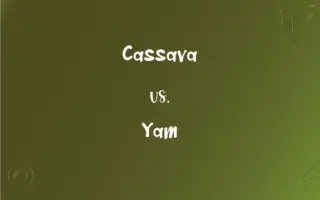Vocation vs. Profession: What's the Difference?
Edited by Aimie Carlson || By Janet White || Published on February 20, 2024
Vocation refers to an individual's calling or natural inclination toward a certain activity, while a profession is a career or job requiring specialized training and formal qualifications.

Key Differences
A vocation is often seen as a calling or a strong desire to spend one's life doing a particular kind of work, especially one that involves helping others. In contrast, a profession typically refers to a field of employment that requires specialized education, training, and often a formal qualification.
Vocational pursuits are often aligned with personal passions and a sense of purpose, leading individuals to careers that they feel inherently drawn to. Professions, however, are chosen based on a combination of education, skill, and the pursuit of a stable career, often in fields like law, medicine, or engineering.
Vocations can be pursued without formal education and may not always offer financial stability, but they often provide a high level of personal satisfaction. Professions usually promise a higher level of societal status and income, along with stability and respect in the community.
Vocations encompass a wide range of activities and can include arts, crafts, or services driven by personal motivation rather than external rewards. Professions are more narrowly defined, with established parameters, ethical codes, and often a regulatory body governing practice.
Vocational paths may not have a clear progression or structured path, allowing for more flexibility and personal exploration. Professional careers, conversely, often have well-defined advancement paths, with clear steps for progression and promotion within a field.
ADVERTISEMENT
Comparison Chart
Definition
A calling or natural inclination towards a certain activity
A career requiring specialized training and formal qualifications
Motivation
Personal passion and fulfillment
Professional advancement, stability, societal status
Educational Requirements
Not necessarily requiring formal education
Requires specialized education and training
Income and Stability
May vary widely; not always financially stable
Generally offers higher income and job stability
Career Path
Flexible, guided by personal interests
Structured, with clear progression and advancement opportunities
ADVERTISEMENT
Vocation and Profession Definitions
Vocation
Vocation refers to a person's employment or main occupation, especially regarded as worthy and requiring dedication.
He pursued carpentry, not just as a job, but as his vocation.
Profession
Profession denotes a career or job characterized by expertise in a particular field.
His profession as an architect required a blend of creativity and technical knowledge.
Vocation
Vocation implies a career or calling driven by an innate passion.
Writing was her vocation; she couldn't imagine doing anything else.
Profession
Profession refers to a field of employment requiring specialized skills and often formal education.
Law is a profession that demands both ethical integrity and academic excellence.
Vocation
Vocation is an individual's calling to a particular profession or occupation.
He felt a vocation to be an artist, dedicating his life to creativity.
Profession
Profession is a paid occupation, particularly one that involves prolonged training and a formal qualification.
She entered the medical profession after years of rigorous study.
Vocation
Vocation is an occupation for which a person is strongly drawn or suited.
Teaching was more than a job for her, it was her vocation.
Profession
Profession implies an occupation that typically involves extensive training and qualifications.
Teaching is a profession that shapes future generations.
Vocation
Vocation denotes a person's life's work, often linked to service and helping others.
Nursing was her vocation, a way to fulfill her desire to help people.
Profession
Profession is a vocation or occupation with a status of respectability and competence.
Being an engineer is not just a job; it's a respected profession.
Vocation
A regular occupation, especially one for which a person is particularly suited or qualified.
Profession
An occupation or career
"One of the highest compliments a child can pay a parent is to choose his or her profession" (Joan Nathan).
Vocation
An inclination or aptness for a certain kind of work
A vocation for medicine.
Profession
An occupation, such as law, medicine, or engineering, that requires considerable training and specialized study.
FAQs
Are professions well-paid?
Generally, professions offer higher financial stability and income.
Do vocations require formal education?
Not necessarily; they are often driven by passion rather than formal training.
Can a vocation also be a profession?
Yes, if one’s personal calling aligns with a professional field.
What is a profession?
A career field that requires specialized training, education, and qualifications.
Can vocations lead to self-employment?
Yes, many people with vocations create their own businesses.
What is a vocation?
A strong inclination towards a particular occupation, often seen as a personal calling.
What’s the role of passion in professions?
Passion can be a motivator but is not always the primary factor.
Is a vocation always fulfilling?
Often, as it aligns with personal interests and passions.
Are professions subject to industry changes?
Yes, they can evolve with advancements in the field.
Is a vocation easy to change?
It can be, as it’s more about personal fulfillment than formal qualifications.
How do people choose a profession?
Based on interests, skills, education, and market demand.
Can someone have multiple vocations?
Yes, one can have multiple interests and callings.
Do professions have regulatory bodies?
Many do, ensuring standards and ethical practices.
Can a hobby become a vocation?
Yes, if it turns into a primary and fulfilling occupation.
Do vocations require certifications?
Not typically, unless they overlap with professional fields.
Are professional careers more secure?
They often offer more job security and structured career paths.
How do professions impact identity?
They often contribute significantly to one’s self-concept and societal status.
Is it common to switch professions?
It can happen, especially with changes in personal interests or market demands.
How does one identify their vocation?
Through self-reflection, understanding personal interests and passions.
What is professional development?
Continuous learning and skill advancement in one's profession.
About Author
Written by
Janet WhiteJanet White has been an esteemed writer and blogger for Difference Wiki. Holding a Master's degree in Science and Medical Journalism from the prestigious Boston University, she has consistently demonstrated her expertise and passion for her field. When she's not immersed in her work, Janet relishes her time exercising, delving into a good book, and cherishing moments with friends and family.
Edited by
Aimie CarlsonAimie Carlson, holding a master's degree in English literature, is a fervent English language enthusiast. She lends her writing talents to Difference Wiki, a prominent website that specializes in comparisons, offering readers insightful analyses that both captivate and inform.








































































